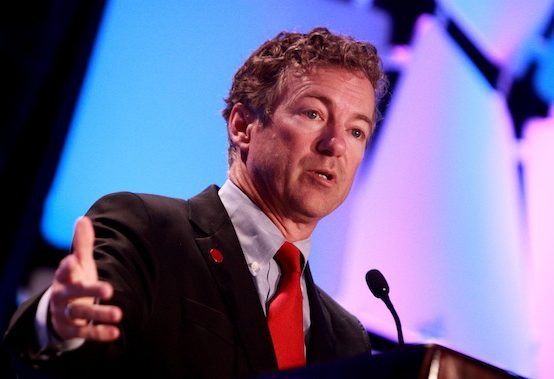Rand Paul on Foreign Policy: A Start, But What’s Next?

As an exposition of the principles that guide his policy on the Senate Foreign Relations Committee—as well as one day perhaps as president—Rand Paul’s recent presentation at the Center for the National Interest made a lot of sense to those who have criticized Washington’s global strategy of recent years.
His commitment to protect the national interest and the distinction he made à la George F. Kennan between “vital” and “peripheral” interests certainly appeal to a realist like myself, as do his cautionary notes about the need to embrace diplomacy before deploying force and the importance of respecting the interests of nations with whom we do not share the same values.
It was nice to get to know Senator Paul’s worldview. But here is the main problem I had with his address: Where is the policy beef, Senator? Provide us with the links between your worldview and the policies you would support and pursue.
Let’s put it in concrete terms: What exactly are the “vital” national interests of the United States as opposed to the “peripheral” ones, here in early 2014? What is the U.S. role in the world today? Do developments taking place in the Middle East and/or East Asia and/or South Asia affect core U.S. national interests, and why? If they do, what should we do about it? Should we maintain our current troop deployment, or cut it, and why would that action strengthen American national security? Should Japan, South Korea, France, Germany, Saudi Arabia, and Israel be regarded as allies of the United States? If so, should we use our military protect to defend them from threats to their security?
Senator Paul’s address followed the all-too-familiar route of other libertarians who discuss foreign policy: reacting and criticizing.
Hence he explained his negative response to President Barack Obama’s original plan for a military attack against Syria and expressed support for the current diplomatic solution “that may well do something that no military strike could perform—remove the chemical weapons.”
But Paul does not explain why chemical weapons in Syrian hands should have been considered a threat to either vital or peripheral U.S. interests in the first place. He seems to take it for granted that they were such a threat and that the only necessary debate was over the means to get rid of these weapons. If the chemical weapons threatened Israel and/or Turkey and/or Saudi Arabia, shouldn’t we have allowed those countries to take care of their own security, instead of insisting on taking a lead in trying to resolve that particular emergency?
In that context, Senator Paul should explain why we are in the Middle East today. Should we remain there as the main outside global player, or should we not? And why is that?
Paul seemed to embrace a similarly reactive approach when it came to Iran and North Korea. “The Syrian chemical-weapons solution could be exactly what we need to resolve the standoff in Iran and North Korea,” he said. “By leveraging our relationship with China, we should be able to influence the behavior of North Korea. Likewise, we should be engaging the Russians to assist us with the Syrians and the Iranians.”
Again Senator Paul did not apply his own formula—vital vs. peripheral interests—to explain exactly why and in which ways Iranian and North Korean nuclear weapons affect U.S. national security. Pakistan and India have nuclear weapons. What’s the difference between these two prospective nuclear powers? And what happens if our attempt to leverage our relationships with Russia and China doesn’t work? Would Rand support the use of military force in that case, and if so why? As in the case of Syria, why shouldn’t the neighbors of Iran and North Korea use their own military power to deter Tehran and Beijing if and when they become nuclear states?
Senator Paul portrays himself as the anti-neoconservative who “doesn’t clamor first for the military option” and is in favor of diplomatic engagement. Nowadays, this is the way almost everyone in Washington describes themselves—even neoconservatives.
But where does he find himself on the diplomatic spectrum: Does he support the use of economic sanctions? Or the provision of military aid to those we regard as allies and client states? Should we operate as part of multilateral military alliances, or not? What about the concept of collective security? Here is a question that brings together all these issues: Did Senator Paul support the first Gulf War, in which military power was purportedly used as a last resort?
After all, Kennan and the other realists that Paul seems to admire were not opposed in principle to the use of military power, certainly not when it came to applying it as part of their containment strategy vis-à-vis the Soviet Union. And they proposed specific policies aimed at protecting U.S. interests around the world, as opposed just critiquing existing policies.
My guess is that if and when Senator Paul were to provide more specific details and let us know where he stands on U.S. foreign policy—in fact and not in theory—he expects that he would probably antagonize vital as opposed to peripheral constituencies in the conservative movement and the Republican Party, possibly hurting his chances of getting becoming the GOP’s presidential nominee in 2016.
But I believe that at the end of the day he would be better off politically and electorally if instead of delivering think-tank addresses and merely reacting to global crises, Rand Paul would initiate a true debate over American foreign policy.
Comments